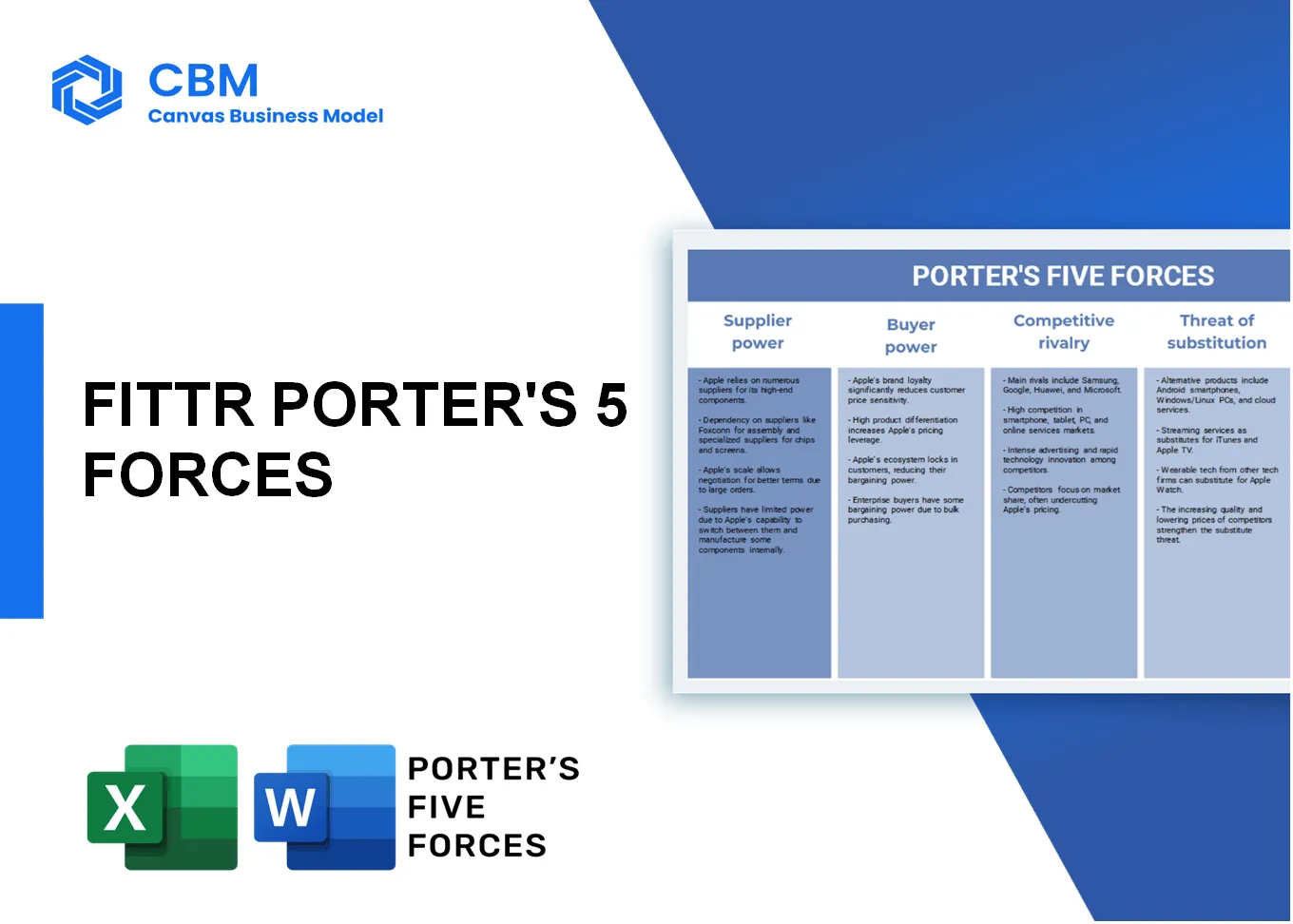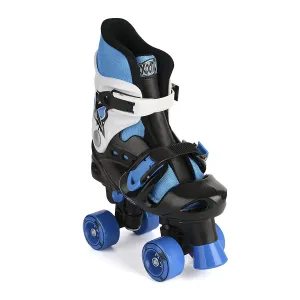In the highly competitive realm of health and wellness, understanding the dynamics of market forces is essential for success. At Fittr, where personalized online coaching transforms fitness journeys, the nuances of Bargaining Power of Suppliers, Bargaining Power of Customers, Competitive Rivalry, Threat of Substitutes, and Threat of New Entrants shape strategic decisions every day. Want to uncover how these forces impact Fittr and the broader industry landscape? Dive deeper into the analysis below!
Porter's Five Forces: Bargaining power of suppliers
Limited number of specialized nutrition and fitness content creators
The market for specialized nutrition and fitness content creators is limited, with approximately 10,000 certified professionals in India as of 2023. The majority of these professionals are independent, creating a fragmented market. A survey in 2022 indicated that around 25% of clients prefer working with certified trainers due to their expertise.
Availability of various online coaching tools and platforms
As of 2023, the global market for online fitness platforms is valued at approximately $6 billion, with an expected compound annual growth rate (CAGR) of 23% from 2023 to 2030. This growing landscape includes over 1,500 active online coaching platforms worldwide.
Dependence on technology providers for platform stability and user experience
Fittr's reliance on technology providers is crucial for delivering a seamless user experience. The downtime cost for online platforms can reach up to $5,600 per minute. The average cost for high-quality technology solutions ranges from $10,000 to $50,000 annually for startups, affecting budgeting and supplier negotiations.
Growing number of supplement and wellness companies increases options for collaboration
The wellness industry is projected to reach $4.75 trillion by 2025, with dietary supplements making up a significant chunk, valued at $140 billion in 2023. Approximately 30% of wellness startups seek partnerships with fitness platforms, expanding supply options for Fittr.
Ability of suppliers to provide quality content impacts brand reputation
According to a 2023 study, over 70% of consumers rate the quality of coaching content as a deciding factor in choosing a fitness platform. The impact of poor content on a brand's reputation can lead to a potential 20% decline in customer retention rates.
| Factor | Statistic/Data |
|---|---|
| Certified Nutrition and Fitness Professionals in India | 10,000 |
| Clients preferring certified trainers | 25% |
| Global Online Fitness Market Value (2023) | $6 billion |
| Expected CAGR (2023-2030) | 23% |
| Active Online Coaching Platforms | 1,500 |
| Downtime Cost per Minute | $5,600 |
| Annual Cost for Technology Solutions | $10,000 - $50,000 |
| Wellness Industry Projection (2025) | $4.75 trillion |
| Dietary Supplements Market Value (2023) | $140 billion |
| Wellness Startups Seeking Partnerships | 30% |
| Consumers Rating Quality as Important | 70% |
| Impact of Poor Content on Retention Rates | 20% |
[cbm_5forces_top]
Porter's Five Forces: Bargaining power of customers
Customers have numerous options for online fitness and nutrition programs.
As of 2023, the global online fitness market was valued at approximately $10 billion, with projections indicating a growth rate of 23.1% CAGR from 2023 to 2030. This saturation of options enables customers to choose from various platforms such as Peloton, MyFitnessPal, and others, thereby enhancing their negotiating power.
Low switching costs among competitors for users.
Switching costs in the online fitness sector are minimal, with a survey indicating that 60% of consumers would switch brands if they found a better service or price. The average cost for fitness apps ranges between $10 and $30 per month, making it easy for customers to transition without significant financial loss.
Increased access to free online fitness resources influences customer expectations.
Research shows that 75% of consumers utilize free resources such as YouTube and Instagram fitness content before making purchases. The availability of free online content raises the expectation for paid services to provide enhanced value, personalized training, and measurable results.
High customer demand for personalized services elevates expectations for service quality.
According to a report, 70% of users have expressed a preference for personalized fitness plans. The increasing demand for tailored training intensifies competitive pressures on entities like Fittr to offer unique programs, thereby increasing the bargaining power of customers.
Customer feedback significantly impacts program offerings and company reputation.
Statistics show that 88% of consumers trust online reviews as much as personal recommendations. Companies like Fittr receive an average of 4.5 stars from user reviews, underscoring the importance of customer feedback that shapes product offerings and overall brand image.
| Factor | Statistical Data | Impact on Bargaining Power |
|---|---|---|
| Global Online Fitness Market Value | $10 billion (2023) | High |
| Projected CAGR (2023-2030) | 23.1% | High |
| Percentage of Consumers Willing to Switch | 60% | High |
| Average Monthly Cost of Fitness Apps | $10 - $30 | Low |
| Percentage of Consumers Using Free Resources | 75% | High |
| Preference for Personalized Plans | 70% | High |
| Consumer Trust in Online Reviews | 88% | High |
| Average User Rating of Fittr | 4.5 stars | High |
Porter's Five Forces: Competitive rivalry
Numerous local and global competitors in the health and wellness space.
The health and wellness industry is characterized by a large number of competitors, both local and global. As of 2023, the global fitness industry is valued at approximately $96 billion. Major players in this sector include:
| Company Name | Market Share (%) | Annual Revenue (USD) |
|---|---|---|
| Peloton | 5.2 | $607 million |
| Planet Fitness | 3.5 | $1.3 billion |
| Anytime Fitness | 2.8 | $1.1 billion |
| Fitbit (part of Google) | 1.9 | $1.4 billion |
| MyFitnessPal | 1.5 | $100 million |
Diverse range of services offered by competitors, including free programs.
Competitors in the market offer a multitude of services, often including free programs to attract users. For instance:
- MyFitnessPal provides free access to its app with premium options.
- Free online workout sessions are available on platforms like YouTube.
- Fitness Blender offers a selection of free workout videos.
In addition, companies like Nike Training Club offer a range of free workouts to engage potential customers.
Heavy investments in marketing and advertising by key players intensifies competition.
Marketing expenditures in the fitness and wellness industry have seen significant increases. In 2022, companies like Peloton spent around $155 million on advertising. Similarly:
| Company Name | Marketing Budget (USD) |
|---|---|
| Peloton | 155 million |
| Planet Fitness | 70 million |
| Gold's Gym | 25 million |
These investments underscore the competitive landscape as companies strive to capture a larger share of the market.
Rapid innovation cycles require constant adaptation to stay relevant.
The health and wellness market experiences rapid innovation, with companies frequently updating their offerings. For example:
- Wearable technology such as smartwatches and fitness trackers have become essential.
- Virtual training sessions have surged following the COVID-19 pandemic.
- AI-driven personalized fitness programs are on the rise.
Fittr, for instance, has integrated AI in their coaching programs to enhance personalization and effectiveness.
Customer loyalty can shift quickly based on trends and social media influence.
Customer preferences in the fitness industry are heavily influenced by trends and social media. Data from a 2022 survey indicated that:
- About 70% of consumers reported changing their fitness routine based on social media recommendations.
- Over 60% of fitness enthusiasts follow brands on social media for updates on trends.
This dynamic environment means that customer loyalty is fluid and can rapidly shift towards brands that effectively leverage social media and influencer partnerships.
Porter's Five Forces: Threat of substitutes
Availability of free fitness and nutrition content on platforms like YouTube
According to YouTube, over 2 billion logged-in users visit the platform every month, with a significant portion searching for fitness-related content. As of 2022, YouTube had over 800,000 fitness channels, with channels like 'Fitness Blender' and 'Blogilates' generating millions of views.
The proliferation of free content makes it easy for customers to find substitutes without incurring costs, with a report indicating that 70% of fitness enthusiasts use YouTube as a resource for workout guidance.
Rising popularity of workout apps and self-guided training programs
The global market for fitness apps is expected to grow from $4 billion in 2020 to approximately $10 billion by 2026, a compound annual growth rate (CAGR) of 15.3%..
Apps like MyFitnessPal and Fitbit showcase features enabling self-guided training, further diverting potential clients from personalized coaching services.
Traditional gym memberships and lifestyle changes can divert customers
The gym industry in the U.S. is valued at approximately $35 billion as of 2022, with over 38% of U.S. adults holding a gym membership.
Moreover, a Gympass survey revealed that 45% of employees use their company-subsidized gym memberships as a primary fitness method, showing the impact of traditional gyms on health and wellness startups like Fittr.
Alternative wellness solutions like group classes and outdoor activities present options
According to statistics from IBISWorld, the group fitness industry in the U.S. generated revenue of $3 billion as of 2023. Group classes often provide social interaction and community support, appealing to many fitness enthusiasts.
Additionally, the outdoor fitness market, comprising activities like hiking and cycling, has seen a 20% increase in participation since 2020, providing further alternatives for consumers.
Social media influence on fitness trends can shift consumer focus quickly
Statistics show that over 80% of fitness enthusiasts have discovered fitness trends through social media, particularly platforms like Instagram and TikTok, which boast 1 billion and 1.2 billion monthly active users, respectively.
Fitness challenges and trends can arise rapidly, leading to shifts in consumer preferences that can adversely affect companies focusing on longer-term coaching strategies.
| Market Segment | Estimated Market Size | Growth Rate (CAGR) | Consumer Engagement (%) |
|---|---|---|---|
| YouTube Fitness Content | Over 800,000 channels | N/A | 70% |
| Fitness Apps | $10 billion by 2026 | 15.3% | N/A |
| Gym Industry | $35 billion (U.S.) | N/A | 38% |
| Group Fitness | $3 billion (U.S.) | N/A | N/A |
| Outdoor Fitness | N/A | 20% increase since 2020 | N/A |
| Social Media Influences | 1.2 billion TikTok users | N/A | 80% |
Porter's Five Forces: Threat of new entrants
Low barriers to entry in the online fitness and wellness industry
The online fitness industry has relatively low barriers to entry. The global online fitness market was valued at approximately **$6.04 billion** in 2020 and is expected to grow to **$59.23 billion** by 2027, with a CAGR of **33.1%** from 2020 to 2027.
Growing interest in health and wellness encourages new startups
In the United States, the health and wellness market was valued at about **$1.5 trillion** in 2021, with an annual growth rate of **5-10%**. This trend has led to over **50,000** fitness-related startups launching globally in the last 5 years.
Technological advancements facilitate easy entry for new players
Technological innovations have made it easier for individuals to enter the fitness coaching space. The number of health and wellness apps available on the market exceeded **90,000** in 2021, showing an increase from around **30,000** in 2015.
Increased venture capital investment in health tech provides funding opportunities
Investment in health tech has seen substantial growth, with total global health tech venture capital funding reaching approximately **$21.6 billion** in 2021, up from **$14 billion** in 2020, indicating a strong interest in health-oriented startups.
Differentiation through unique offerings becomes crucial as new entrants emerge
With the increasing number of entrants, differentiation is essential. According to a 2022 survey, **65%** of consumers expressed interest in personalized fitness programs, emphasizing the necessity for companies like Fittr to innovate and differentiate their offerings.
| Year | Global Online Fitness Market Value (in billion USD) | Health and Wellness Startups Launched | Total Health Tech VC Funding (in billion USD) |
|---|---|---|---|
| 2020 | 6.04 | 10,000 | 14 |
| 2021 | 21.23 | 15,000 | 21.6 |
| 2022 | 31.00 | 20,000 | 25 |
| 2023 | 40.12 | 25,000 | 30 |
| 2027 | 59.23 | 35,000 | 40 |
In navigating the competitive landscape of Fittr, a keen understanding of Michael Porter’s Five Forces provides invaluable insights. The bargaining power of suppliers and customers shapes operational strategies, while the competitive rivalry necessitates innovation and adaptability. Additionally, the threat of substitutes and new entrants compel Fittr to continuously enhance its offerings. Recognizing and responding to these forces not only solidifies Fittr's market position but also elevates the overall customer experience, thus enabling the startup to thrive in an ever-evolving health and wellness industry.
[cbm_5forces_bottom]












